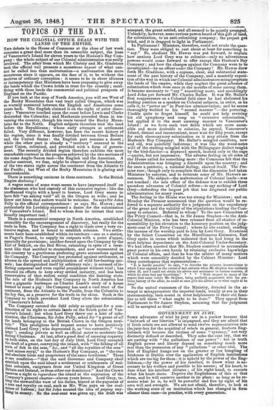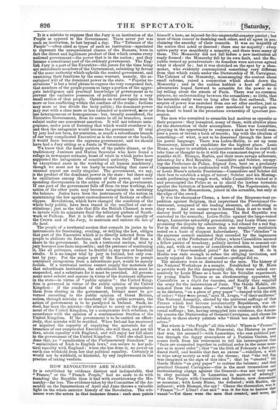GOVERNMENT BY JURY.
Soma advocates of trial by jury are in a pucker because that "bulwark of our liberties " is impugned, and they are afraid that if Irish rebels are not allowed to send twelve representatives into the jury-box for the acquittal of rebels in general, freeborn Eng- lishmen will become the victims of some "tyranny," not very distinctly defined or described. They echo the cant cry, that we are parting with "the palladium of our power " : but in truth English power and liberty depend on something much more real than the possession of any " palladium" or other idol. The fate of England bangs not on the greater or less bungling of Irishmen in Dublin over the application of English institutions which are too big for them : it is upheld by the power of the Eng- lishman,—by the power of his intellect, to know what is ne- cessary to his welfare and possible to his means; of his heart, to dare what his intellect dictates ; of his right hand, to execute what his heart dares. Deprive the Englishman of this or that form, and he will contrive another in its place : as long as he re- mains what he is, he will be powerful and free by right of his own will and strength. We are not afraid, therefore, to look at the working state of an institution which has changed in form oftener than once—in practice, with every generation. It is a mistake to suppose that the Jury is an institution of the People as opposed to the Government. There never yet was such an institution, to last beyond a day. The "Tribunes of the People"—often cited as types of such an institution—appointed to represent the unrepresented classes of the Romans, were in fact the direct and legitimate product of that which creates every national government—the power that is in the nation ; and they became a constituent part of the ordinary government. The Eng- lish Jury is a part of the Executive—the jurors for the time being an subordinate members of the Government, subsisting by favour of the same authority which upholds the central government, and exercising their functions by the same warrant, namely, the as- certained will of the dominant power in the state. "Popular in- stitutions" is but a brief phrase to express the very compound fact, that numbers of the people possess so large a portion of the aggre- gate intelligence and practical knowledge of government as to prevent the exclusive possession of political power by a very small section of that people. Opinions on various topics may be more or less conflicting within the confines of the realm ; factions may more or less divide the body politic ; the dominant power may rest with a class more or less extended or narrowed, waore or less heterogeneous or homogeneous : but, broadly considered, the Executive Government, from its centre to all its branches, must subsist under one concurrent sanction. It will not tolerate anta- gonisms, under pain of fostering that which would overthrow it ; and then the antagonist would become the government. If trial by jury had not been, for centuries, as much a subordinate branch of our very complicated Executive as is the coroner or the beadle, it would have become the supreme government, and we should have had a Jury sitting as a Junta in Westminster. We know that the hardy patriots of the public dinner, or the traditionary Juniuses and Mutius Sctevolas who have found a refuge in newspaper columns, boast of trials in which juries have aupported the antagonists of constituted authority. There may be exceptional cases in the working of all human machinery; though we must not be too hasty in concluding that cases of unusual aspect are really singular. The government, we say, is the product of the dominant power in the state : but there may be oscillations among the elements of that power, and corre- Ronding discrepancies in the action of parts of the government. If one part of the government falls off from its true working, the action of the other parts may become antagonistic in restoring the balance. Juries have been the instruments of the nation in maintaining the law against encroachments of factions or official cliques. Revolutions, which have changed the condition of the whole body politic, have been traced in the smallest of our in- stitutions; just as the tide that fills the British Channel is seen to invade with its miniature flood the tributary gutters of South- wark or Fulham. But it is the office and the boast equally of the Crown and of the Jury, to maintain and enforce the law of the land.
The people of a territorial section that compels its juries to be instruments for frustrating, evading, or defying the law, obliges that _part of the Executive which is so directly selected from the people to abdicate its functions, and thus cuts itself off from a share in the government. In such a territorial section, trial by jury becomes ipso facto impossible; and the pretence of continuing
like all pretences, cannot be fruitful in any true or beneficial results. • It is no longer trial by jury in Ireland, but only con- test by jury. For the major part of the Executive to permit continued antagonism from a subordinate part, would be merely foolish. If a territorial section cannot supply the materials for that subordinate institution, the subordinate institution must be suspended, and a substitute for it must be provided. All govern- ment must subsist and operate in virtue of the dominant influence in the state—in virtue of "public opinion " : the United King- dom is governed in virtue of the public opinion of the United Kingdom : if the conduct of the Irish people incapacitates them from sharing in the goirernment, Ireland must be go- verned according to the public opinion of Great Britain, unless, through mistake or treachery of the public servants, the action of government is to be paralyzed in Ireland. Such, in- deed, has been the mistake—the attempt to carry on the govern- ment of the United Kingdom, by a compromise with rebellion, in accordance with the opinion of a contumacious fraction of the United Kingdom. If the government is to be carried on effect- ively, that mistake will be rectified. When Ireland has recovered or acquired the capacity of supplying the materials for all branches of our complicated Executive, she will then, and not till then, attain equality with England, and will enjoy her full share in the government of the United Kingdom. Until she shall have done that, no "equalization of the Parliamentary franchise," no "assimilation of Irish to English laws," can secure to her poli- tical equality with England : when she has done it, no power on earth can withhold from her that political equality. Certainly it would not be withheld, or hindered, by any improvement in the practice of taking verdicts.



























 Previous page
Previous page